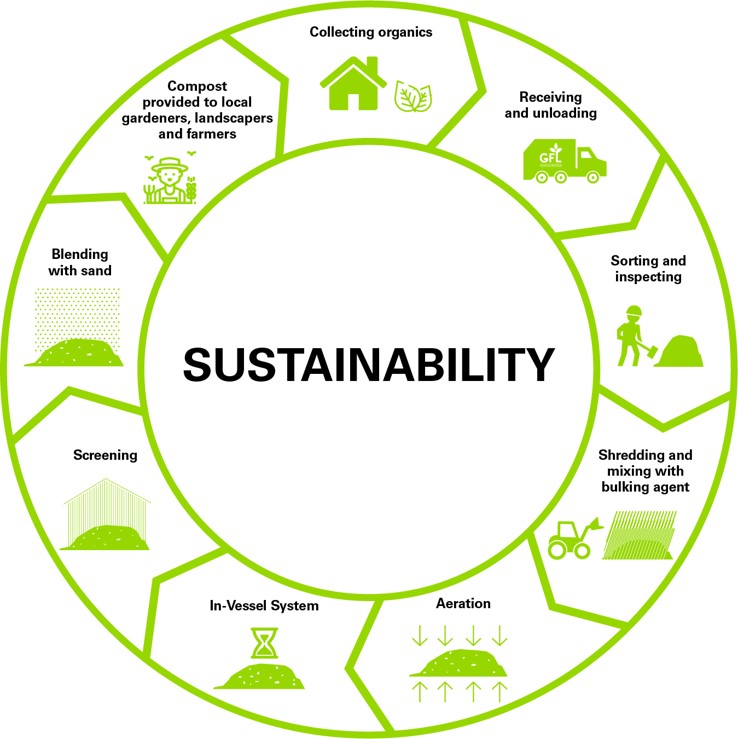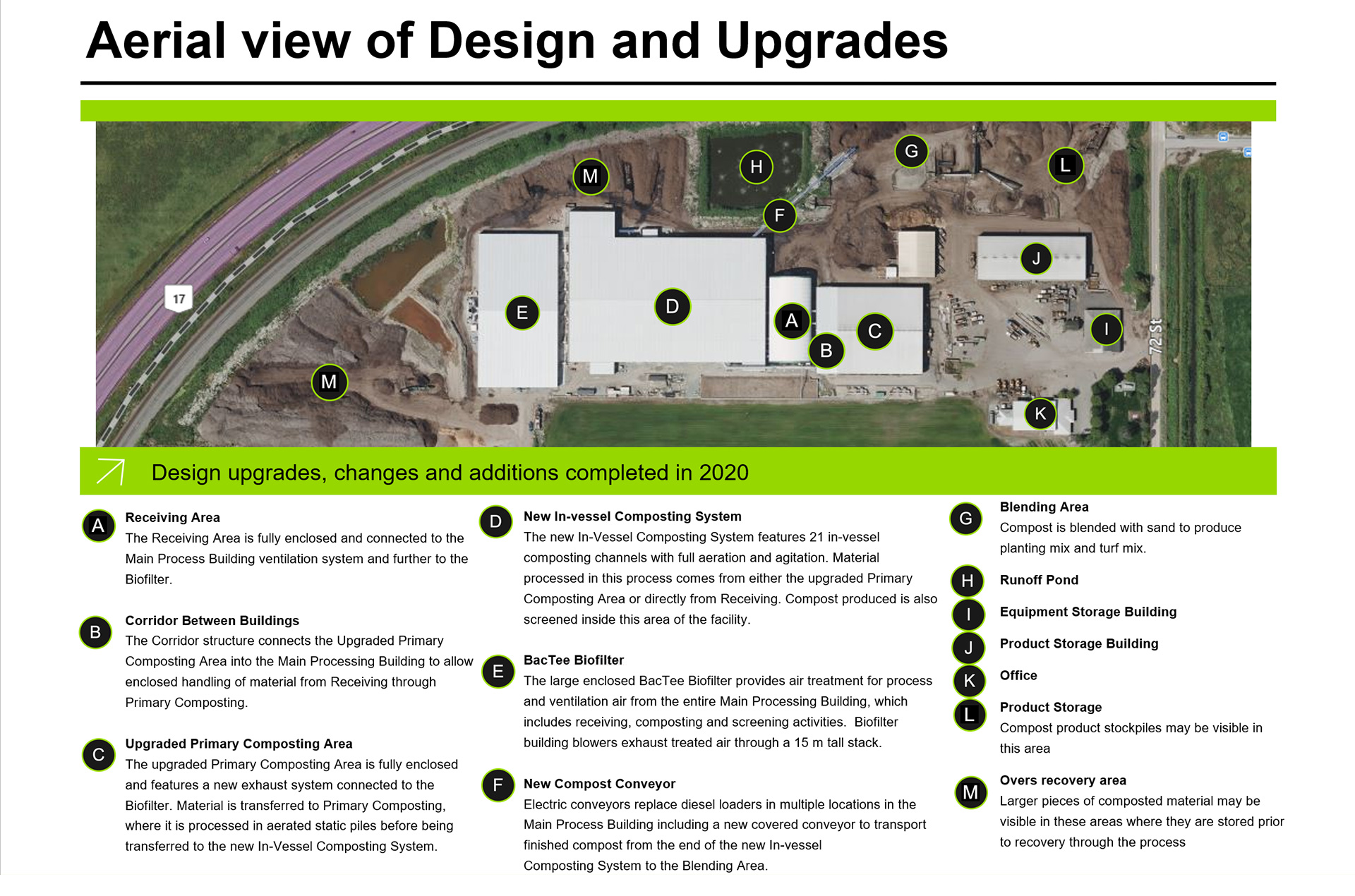Did You Know?
Estimates vary with time, but on average, Canadians generate about 0.7 tonnes of waste per person per year. People in BC generate less than the Canadian average, second only to the rate in Nova Scotia, at just less than 0.6 tonnes per year.
Generally curbside solid waste from residential areas contains about 1/3 organic material (food scrap and yard waste) that can be diverted from landfill, and therefore GFL Delta Composting is capable of providing service that reduces greenhouse gas emissions, and conserves landfill capacity for a population of approximately 750,000 people in the Metro Vancouver area and BC Lower Mainland. ,
GFL Delta Composting is licensed to process up to 150,000 tonnes of approved organic material per year, making it one of the largest composting facilities in Canada. At least 50% of our compost produced at our facility is used for sod farming. Due to the process and emission control technologies in place, the GFL Delta Composting site is able to emit the equivalent emissions of a 15,000 tonne/year traditional windrow compositing facility.
In 2020, by recycling organic waste instead of sending the waste to a landfill site, the GFL Delta Composting facility avoided more than 69,000 MTCO2e of emissions. That is like converting more than 15,000 gas power cars to zero emission vehicles. It also represents almost 45% of GFL’s 2020 emissions avoided from organics recycling. The GFL Delta Composting facility avoids more emissions per tonne of organic material recycled. This is due to the quantity of food diverted from landfills and the state of the art composting processed served by biofilters.
FAQ
General
Our GFL Delta Composting facility receives approved organic waste from our customers and processes it into nutrient-rich compost, and landscaping products such as planting mix and soil mix which contributes to the circular economy for organics. GFL uses our own products at our sod farm, West Coast Instant Lawns. Our customers of our products also include other farmers, commercial landscapers and private residential customers in the Lower Mainland.
In the interest of continuing to be a good member of the community, GFL personnel conduct daily (at a minimum) drive arounds through the community to help determine if there are any odours within the community that can be directly attributable to the GFL Delta Composting facility. Further, as soon as practical, and once wind direction toward surrounding communities has been verified, GFL personnel will conduct a community drive around following receipt of an odour complaint as part of the internal investigation.
GFL Delta Composting services municipalities in the Lower Mainland of BC, as well as private customers in the region whereby we collect their organic waste to be processed at our facility.
Our GFL Delta Composting facility processes lawn and garden, and food organic waste.
The organic waste our GFL Delta Composting facility processes all comes from our customers in the Lower Mainland BC region.
Yes. We offer free-of-charge drop off of yard waste to Delta residents. We ask that residents use the curbside programs for other approved organics such as food waste in order to maintain separation between our light vehicle yard waste drop-off, and our receiving area that is setup for heavy trucks.
The types of organic materials that can be accepted are the GFL Delta Composting facility are documented in our approvals with Metro Vancouver. GFL employees work to reject loads of acceptable materials before they are tipped in our receiving building, and pick unacceptable materials out of the receiving area for appropriate disposal. Acceptable and Unacceptable Material in our permits are provided below.
Acceptable Material
The Facility may accept for composting purposes the following types of Compostable Material which are considered Municipal Solid Waste:
- Food Waste
- Yard Waste
- Soiled Paper
- Packaged Organic Waste
- Waxed Corrugated Cardboard
- Clean wood waste that has not been treated with anti-sapstain or other wood preserving chemicals,
- Other materials specifically authorized in writing by the Solid Waste Manager and such authorization shall be deemed to form part of this Licence.
For Co-composting purposes, the Facility may accept the following types of Compostable Material which are not considered Municipal Solid Waste:
- Industrial organic waste, other than that specifically excluded in the Unacceptable Material Section below
- Agricultural organic water, other than that specifically excluded in the Unacceptable Material Section below
- Bulk Liquids
- Other materials specifically authorized in writing by the Solid Waste Manager.
The Facility shall not accept any materials while the Facility’s primary composting aeration system is non-functional.
Unacceptable Material
The Facility shall not accept:
- Any other waste not authorized in Acceptable Material section above of this Licence and specifically not:
- Hazardous waste
- Biosolids, wastewater treatment plant sludge, grit, and screenings.
- Dead animals, abattoir waste, hatchery waste, fish waste and chicken manure
- Wood other than clean wood waste that has not been treated with anti-sapstain or other wood preserving chemicals.
Yes, materials that are banned or restricted from disposal by Metro Vancouver are described in the GFL Delta Composting facility permits as shown below. Our receiving area is designed to take acceptable materials including yard waste, clean wood waste, and food waste, while our team works to separate other materials on this list for transfer to other appropriate facilities.
Material Bans
Disposal of the following materials are banned or restricted. They are either recyclable or hazardous.
- Yard Waste
- Newspapers
- Corrugated Cardboard
- Office Paper
- Gypsum Waste
- Lead Acid Batteries
- Electronic Waste
- Paints Solvents and Flammable Liquids
- Clean Wood Waste
- Medications/ Pharmaceuticals
- Blue Box Recyclable Material
- Beverage Containers (all except milk)
- Tires
- Oil Filters and Empty Oil Containers
- Pesticides, Solvents and other Household Hazardous Waste
- Mattresses
- Food Waste
All reasonable efforts shall be made to recover recyclable material from all materials received at the Facility, for the purpose of recycling.
Additional Resources (Metro Vancouver)
Operations
Below is series of images of our GFL Delta Composting facility that shows the upgrades in different ways. A timeline summary is also available that shows our application process, regulatory decision(s) and upgrades made. 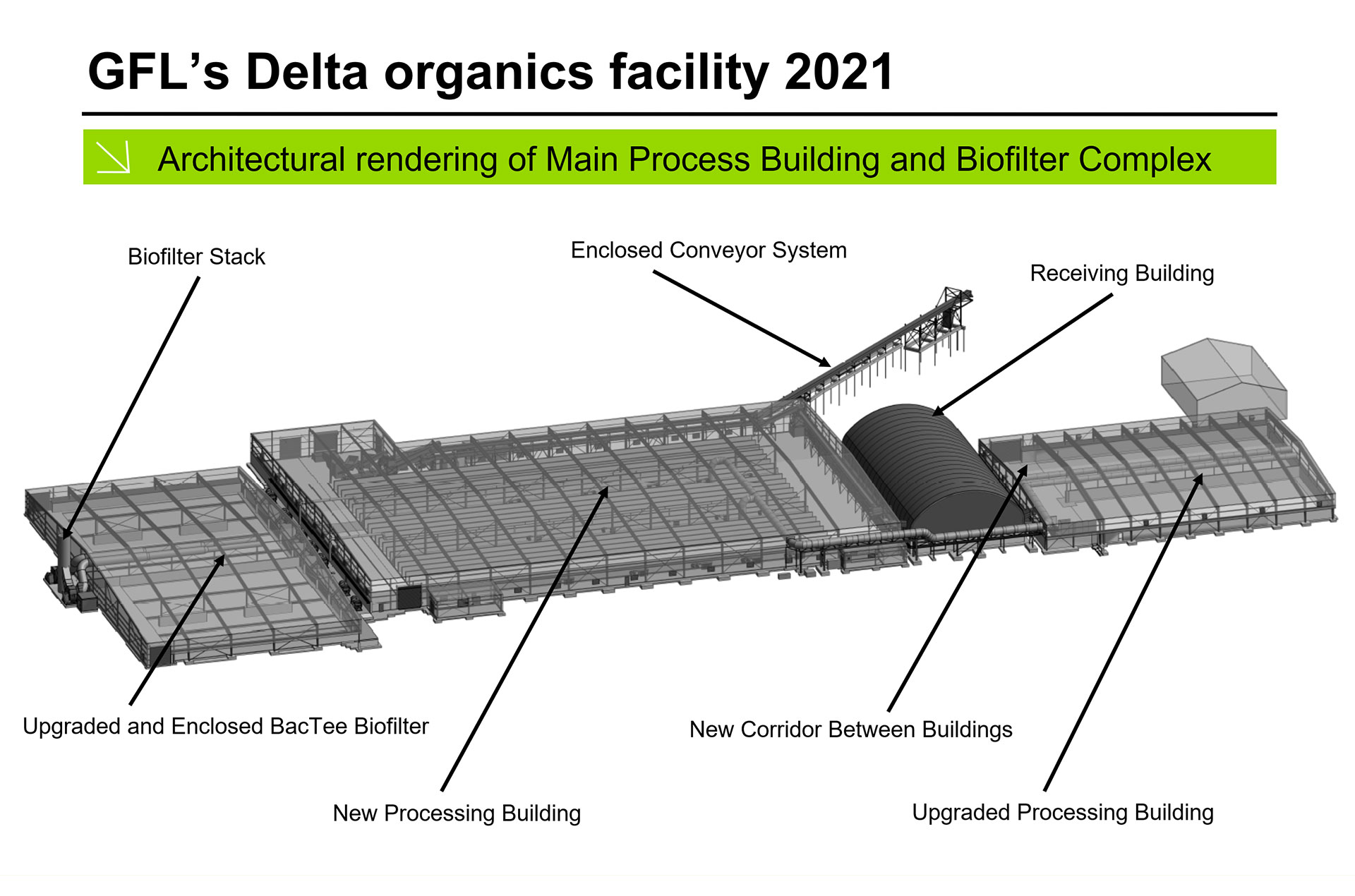
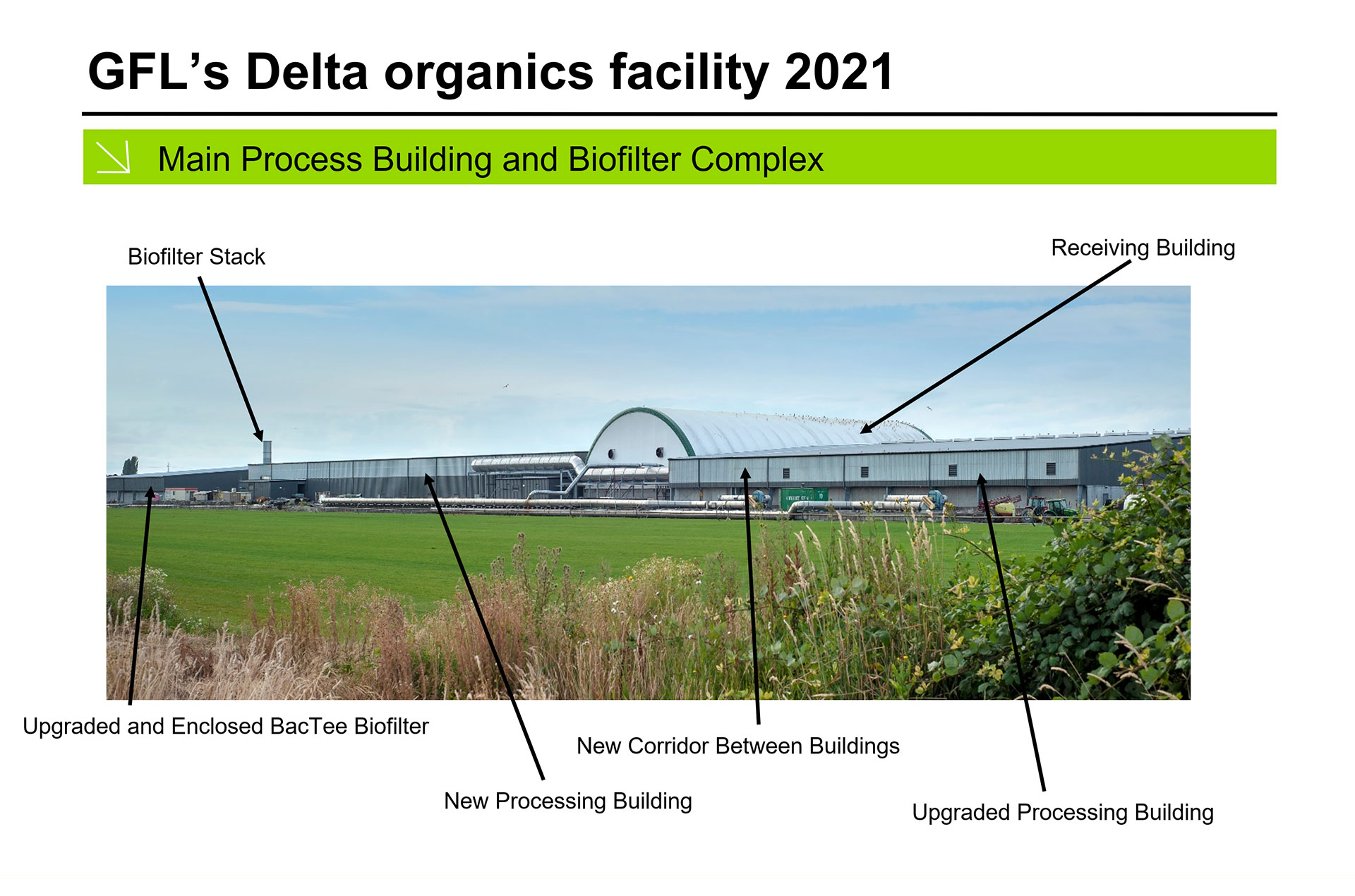
Blending and Product Storage Area
Compost product ready to be loaded on to customer trucks and trailers may be visible in this area.
Overs Recovery Area
Larger pieces of composted material may be visible in these areas where they are stored prior to recovery through the process.
Our GFL Delta Composting facility includes industry leading technology for material movement, aeration, and odour control. This technology has a more compact footprint that allows the Main Process Building to be enclosed with a biofilter for to treat process odours.
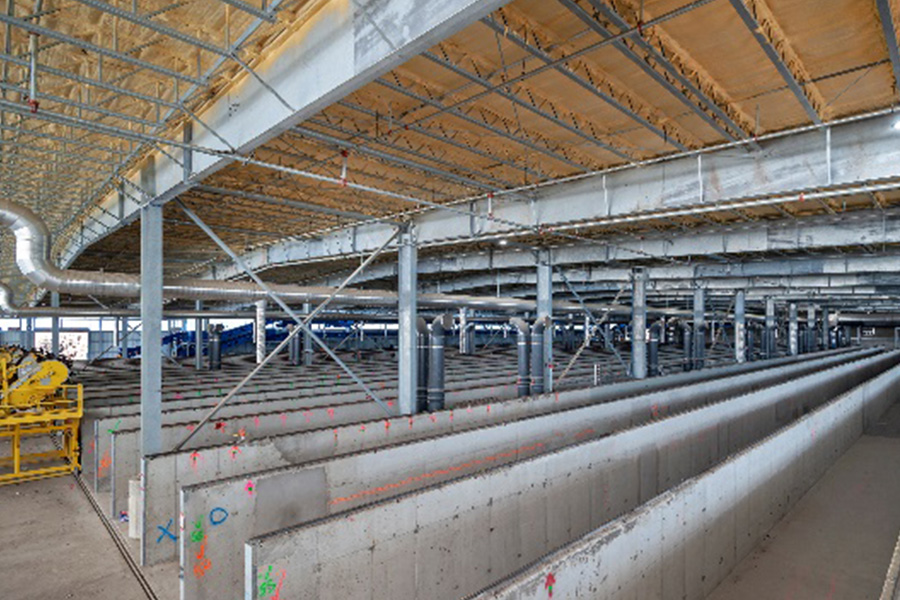
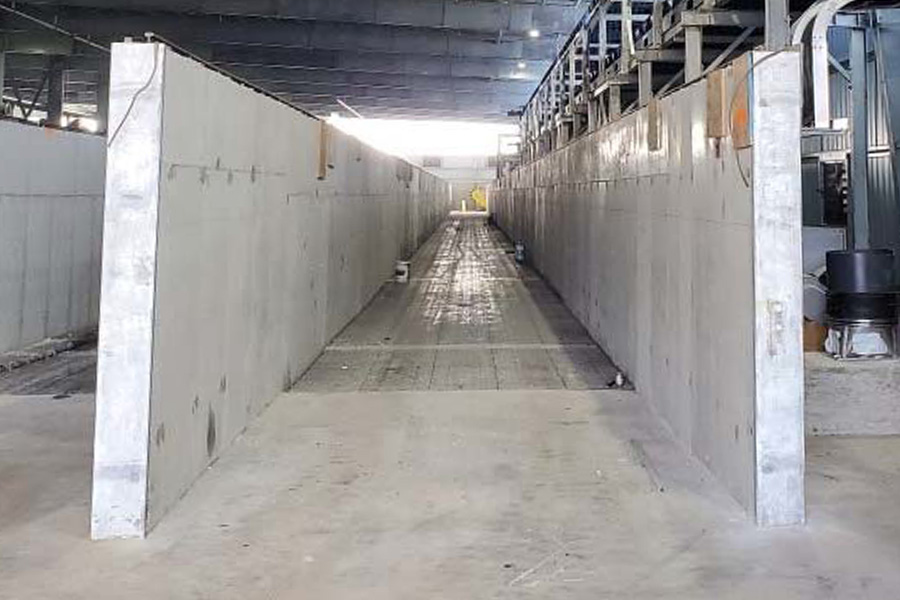
Agitated Bay support compact footprint, support agitators, and provide excellent aeration using BacTee Flooring system
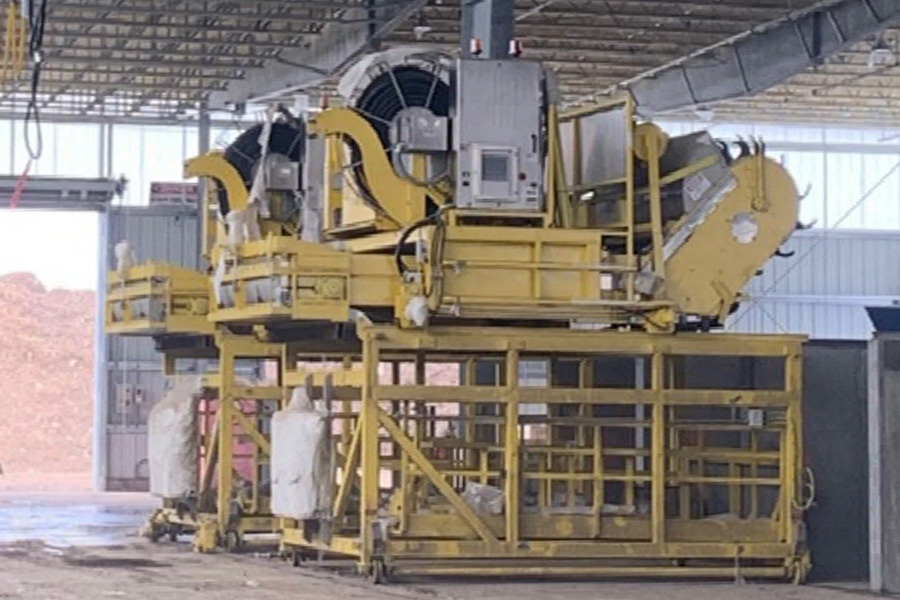
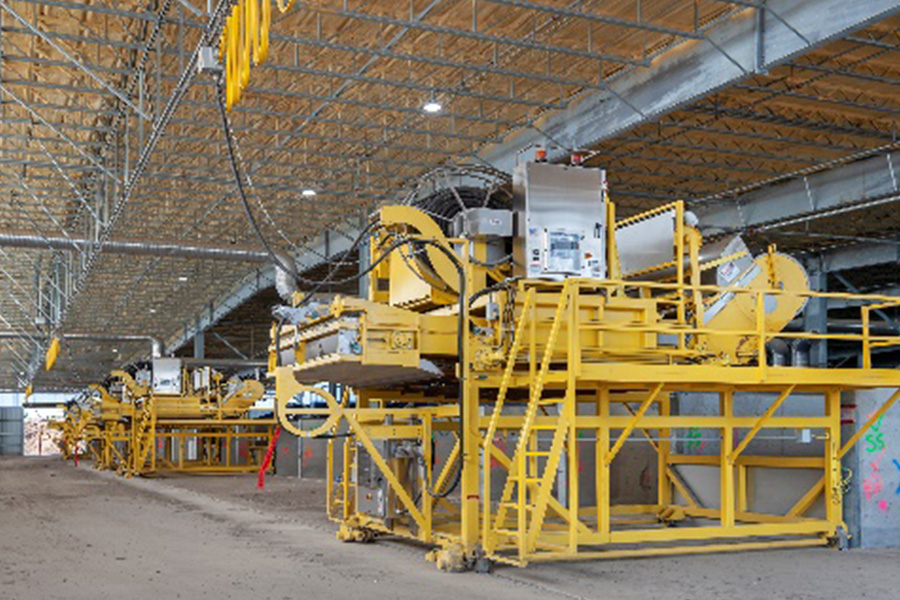
Electric powered agitators support aeration and move material through the composting process
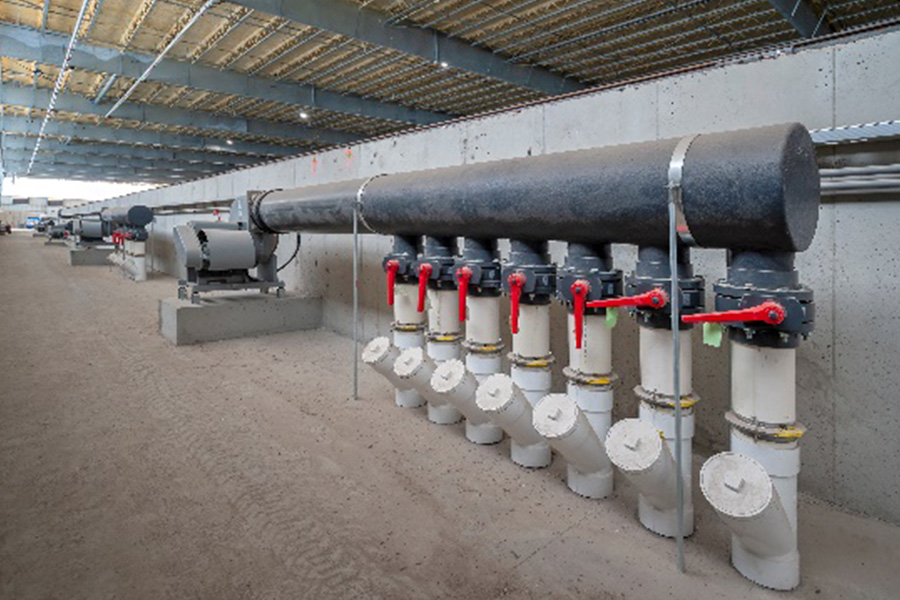
40 new blowers provide control of oxygen and temperature at 105 aeration zones across 21 composting Bays
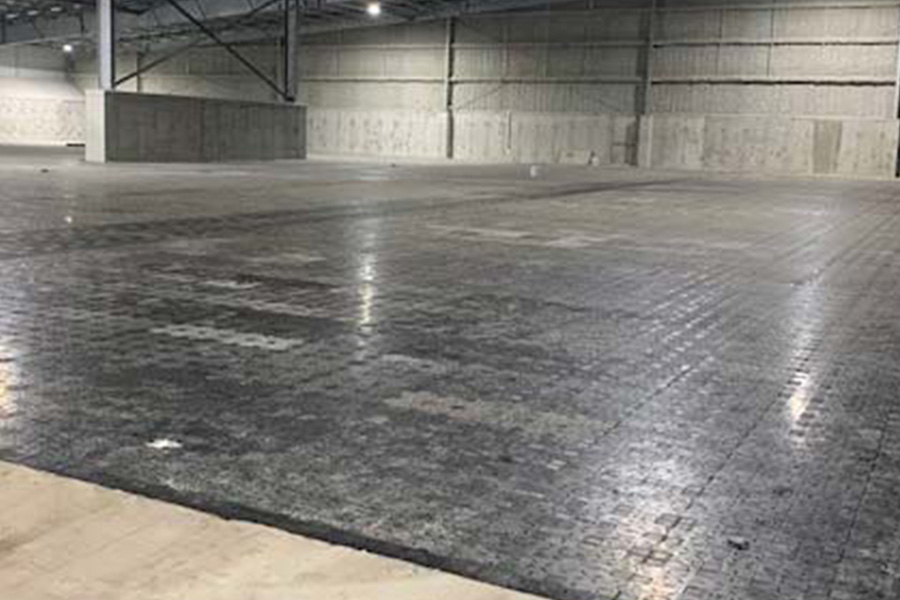
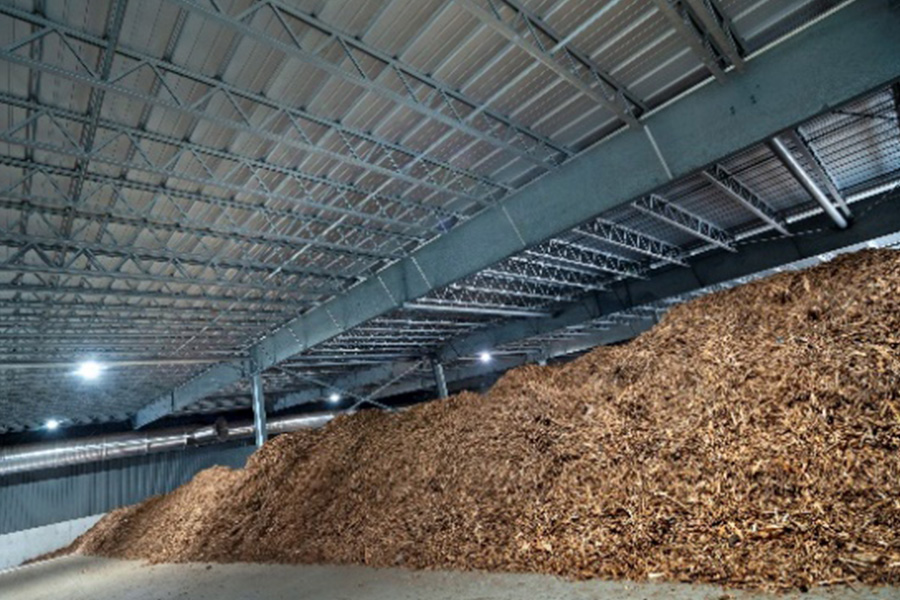
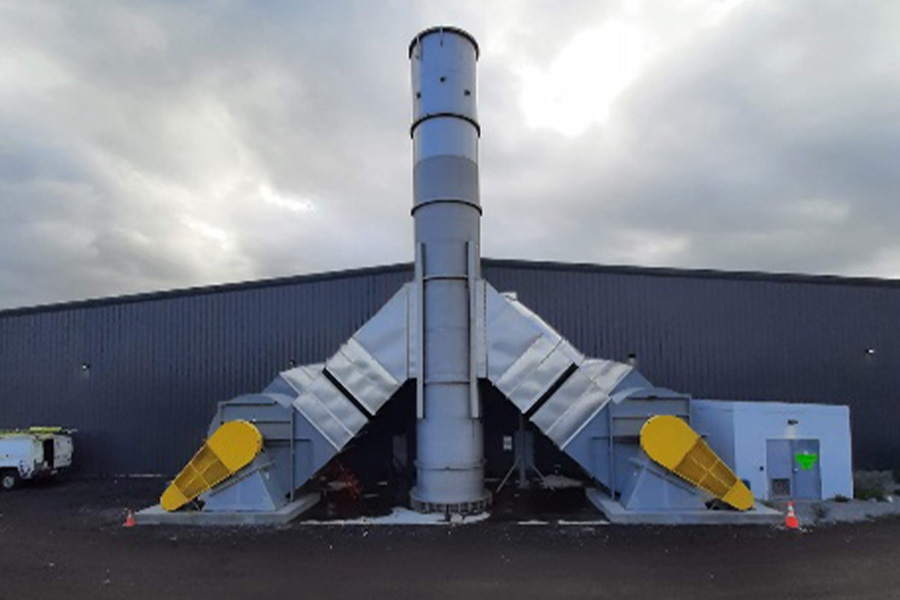
New Enclosed Biofilter with BacTee flooring system for air distribution, woodchip media for odour removal, and 15 m stack for dispersion is industry leading control technology.
GFL has sought a permit that is clear, fair and allows us to focus our efforts and resources on effectively managing the GFL Delta Composting facility in an environmentally responsible manner today and in the future. We have also sought a longer-term operating license in line with the $50 million long-term investment made to our facility.
Environmental Management
Yes, we encourage residential and industrial neighbours to contact us direct if you have inquiries about an odour you’re detecting and feel it is coming from our facility. We will initiate an investigation of the detected odour. Getting your feedback directly when you smell something makes our investigation more effective. Please contact us using this form.
The GFL Delta Composting facility’s operating approval is issued by the British Columbia Ministry of Environment and Climate Change Strategy (BC MoE). The facility also operates under a Solid Waste Licence and an Air Quality Management Permit issued by Metro Vancouver, currently under review. Further, the facility works to fulfill obligations outlined by the Provincial Agricultural Land Commission (ALC), an independent administrative tribunal dedicated to preserving agricultural land and encouraging farming in British Columbia.
As part of our regulatory operating approval, we are required to submit the following operating and environmental reports each year to Metro Vancouver.
Operating Reporting
- Annual Operating Period Report
- Quarterly Operating Period Quantities Report
- Annual Materials and Products Report
- Annual Biofilter Monitoring Report
- Annual Maintenance and Capital Activities Report
Environmental Reporting
- Biofilter Quarterly Emissions Testing Plans and Reports
- Odour Management:
- Odour and Air Quality Complaint Management Plan
- Annual Odour and Air Quality Complaint Management Performance Review
Yes, other environmental monitoring activities our Delta Organics facility conducts include the following:
- Quarterly water samples from the on-site construction water pond are collected. The associated analytical results are included in our annual reports
- An annual report is provided to the City of Delta
- An annual report is provided to the BC MOE

